Experts have long expected that the market will reach consensus on the attractiveness of the Vietnamese stock market and its ability to soon be upgraded to an emerging market, attracting foreign capital. But the reality is the opposite. Vietnam has been a market that has been sold off heavily in the past 4/5 years, with the highest selling rate in the region when calculated based on capitalization or total value held by foreign investors.
Data from SSI Research shows that ETF funds accelerated net withdrawals in March, with the net withdrawal value recorded at VND2.4 trillion, the highest since July 2024, equivalent to 4.3% of total assets at the end of 2024, bringing total assets of ETF funds to VND55.7 trillion. However, the withdrawal value in the first 3 months of 2025 was still 44.6% lower than the same period in 2024.

Most funds were in a state of net capital withdrawal in March, especially foreign funds. Specifically, Fubon fund had the highest net withdrawal since September 2021 (-1.5 trillion VND). Meanwhile, VanEck Vietnam ETF (-123 billion VND) or Xtrackers FTSE Vietnam Swap UCITS ETF (-72.8 billion VND) only had a slight net withdrawal.
Domestic funds increased net withdrawals, DCVFMVN30 ETF (-315.8 billion VND) recorded its fourth consecutive month of net withdrawals, DCVFMVN Diamond ETF (-336 billion VND), SSIAM VNFinlead ETF (-39 billion VND). KIM Growth VN30 ETF is one of the few funds with net capital inflows (+19.3 billion VND) in the month.
Similarly, cash flows from active funds all recorded net withdrawals in March. Active funds investing only in Vietnam and multinational investment funds withdrew net VND504 billion and VND1.6 trillion, respectively. In Q1/2025, active funds investing only in Vietnam withdrew VND2.1 trillion.
Along with Southeast Asian markets, foreign investors continued to maintain a net selling trend in the Vietnamese stock market, with a net selling value of VND 11 trillion in March alone, and selling nearly VND 28 trillion in the first quarter of 2025.

As of March 31, foreign investors' ownership ratio by capitalization was only 15.8%, the lowest level since 2009.
Previously, in 2024, foreign investors net sold a total of more than VND93,000 billion worth of Vietnamese stocks, nearly four times higher than the previous year. This is the strongest net selling level in the history of the Vietnamese stock market. In the five years since the Covid-19 pandemic began, foreign investors have net sold a total of VND167,200 billion, nearly double the value of their net purchases in the previous 13 years (2007 - 2019).
SSI experts believe that foreign investors are net sellers in the context of cautiously observing the next developments of tariff policies and looking to European markets or emerging markets. However, the weakening of DXY will still be a supporting factor to limit net selling pressure from foreign investors.
SGI Capital's team of analysts has previously analyzed that Vietnam's market valuation is not more attractive than other markets, although most of the capitalization belongs to groups with high cyclical risks such as banking, finance, and real estate. Therefore, the expectation that foreign capital will return to net buying in 2025 will be difficult to achieve if valuations are not cheap enough and exchange rate risks still exist.
At the end of each monetary easing cycle, after the influx of money and a large number of new investors have entered the market, good opportunities will become difficult to find and the attractiveness of the stock market will also decrease. The money will then be shared with other investment channels such as real estate, gold, or digital assets...
“In the context of unfavorable cash flow, at a generally not cheap valuation, the price movement of each share will depend largely on the intrinsic strength of the business and the financial capacity of shareholders. Divergence can be very harsh in this year's weak cash flow environment," SGI Capital stated.

At a press conference on April 3, Mr. Ha Duy Tung, Vice Chairman of the State Securities Commission (SSC), said that the total net selling value in the first quarter only accounted for about 1.9% of the foreign portfolio - considered a relatively small proportion. According to him, the market is being affected by Donald Trump's reciprocal tax. This development may continue, depending on the implementation policy in the US and the regulatory response in other countries, including Vietnam.
Sharing more, Deputy Minister of Finance Nguyen Duc Chi said that foreign investors' activities always change - "sometimes withdrawing, sometimes putting money in". Particularly in the first quarter, capital flows fluctuated more than usual, due to the influence of many factors, including investment strategies, fund policies and market psychology.
"We have met the legal criteria, ensured transparency, and created favorable conditions for foreign investors. However, the ranking depends on subjective assessments from international organizations. The ultimate goal is to develop the Vietnamese stock market in a substantial, stable, and sustainable direction. When that quality is reached, upgrading the ranking will be an inevitable step," Mr. Nguyen Duc Chi emphasized.
In the coming time, experts from Yuanta Vietnam Securities predict that foreign investors will buy more when the new information technology system is put into operation and Vietnamese securities are upgraded according to FTSE Russell. However, the cash flow of this group depends on the international macro situation and fluctuations of the USD.
Recently, the strength of the US dollar as measured by the DXY index has decreased from 110 to around 103-104. With the weaker USD, Vietnam is expected to have an easier time regulating the exchange rate.
Currently, the VND/USD exchange rate remains high mainly because the State Bank is maintaining a loose monetary policy to stimulate the economy. Thanks to the positive moves of the management agency to pump money, the stock market also has more momentum, especially in terms of liquidity. From there, the VN-Index has room to grow and attract foreign investors' cash flow.
Source: https://baodaknong.vn/lien-tuc-rut-von-ti-le-so-huu-khoi-ngoai-ve-day-16-nam-248896.html









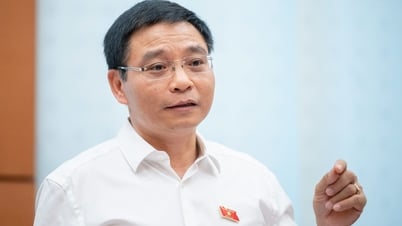
















































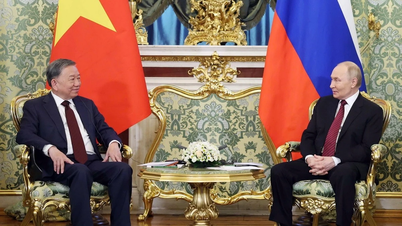

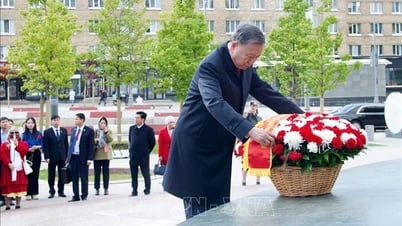
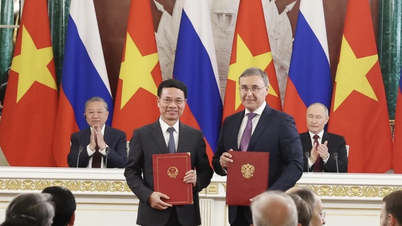

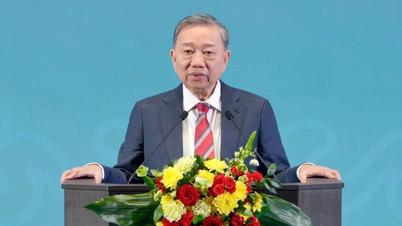













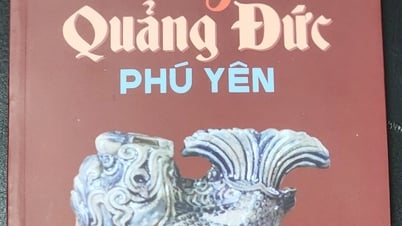














Comment (0)